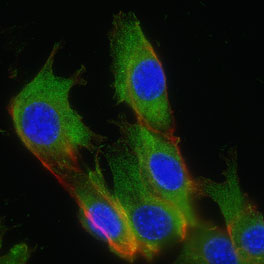Pancreatic cancer (PDAC) is the fourth leading cause of cancer-related mortality in the United States. Despite a wealth of preclinical research, pancreatic cancer still carries a poor prognosis with less than 10% of patients surviving to 5 years. Thus, there is a pressing need to utilize mouse models of pancreatic cancer to gain a deeper understanding of the biology underlying this disease and to uncover novel therapeutic strategies. In our lab, we have developed several mouse models of pancreatic cancer that recapitulate the progression and histology of human PDAC. Using tumors, organoids and cell lines derived from these models, we are studying the role of KRAS, P53 and other PDAC-related genes to gain a deeper understanding of the biology of pancreatic tumors and discover more effective therapeutic approaches for this deadly disease.
Harnessing the immune system to fight tumors has been a promising approach in many cancer types, but not PDAC. Dr. Meaghan McGeary uses novel lineage tracing technology (Yang et. al; 2021) to uncover the clonal dynamics of PDAC tumors as they progress and interact with their host microenvironment over time. Dr. Hanna Hong is exploring the role of the tumor-draining lymph node (TDLN) in shaping the immune response in an immunogenic model of PDAC that we recently generated and will test whether CD8 T cell activation in the TDLN plays a role. These projects will inform rational development of novel treatment approaches to improve survival of patients with PDAC.

Immunofluorescence staining of Pancreatic ductal adenocarcinoma (PDAC) cells. Nuclear DNA (blue - DAPI), F-actin (red - phalloidin), and Paxillin (green).

